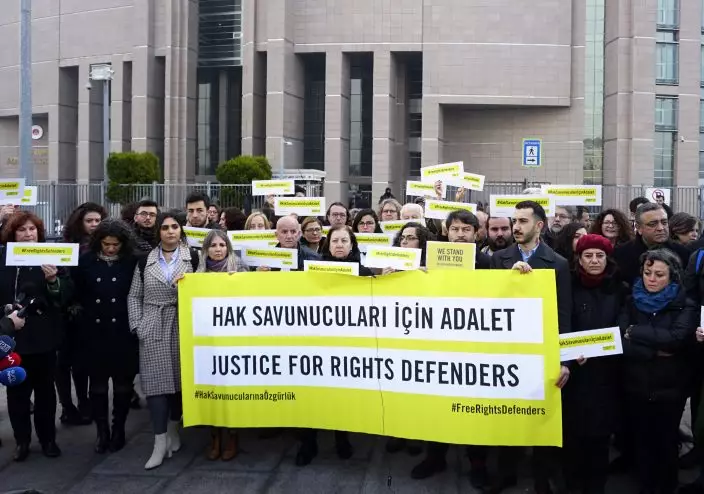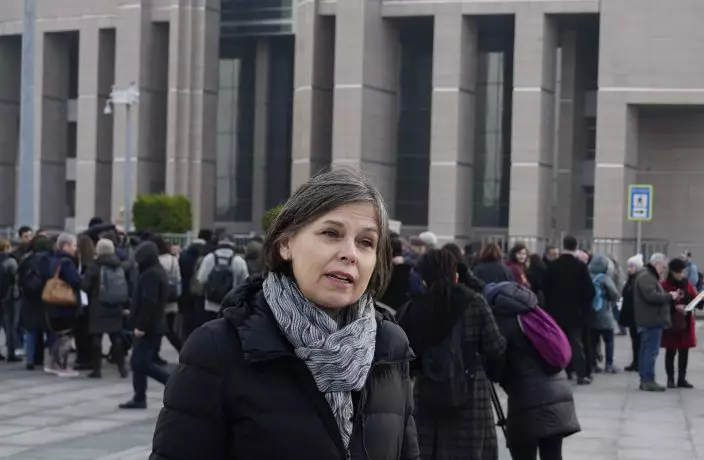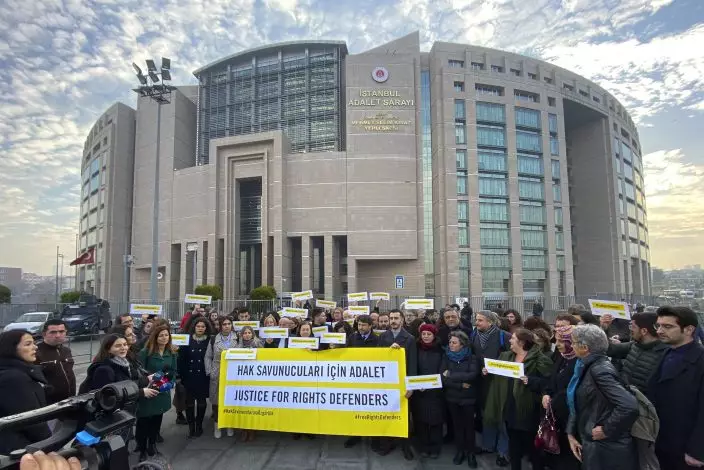A group of human rights activists delivered their final statements in their own defense on Wednesday before a court in Istanbul hands down a verdict in their closely-watched trial on charges of belonging to or aiding terror groups.
The case against Amnesty International's former Turkey chairman and 10 other activists heightened concerns about Turkey's treatment of human rights defenders and helped sour Turkey's relations with European nations, notably with Germany.
The trial comes a day after Turkish prosecutors ordered a prominent philanthropist, Osman Kavala, detained for alleged ties to a 2016 coup attempt, just hours after a court acquitted him on terrorism-related charges over anti-government protests in 2013.Human Rights Watch called the decision to re-arrest Kavala, who has already spent 840days in prison, “vindictive and lawless."

Turkish and international human rights activists face the media before the trial of the Amnesty International's former Turkey chairman and 10 other activists, in Istanbul, Wednesday, Feb. 19. 2020. A court in Istanbul will hand down verdicts for defendants in the closely-watched trial on charges of belonging to or aiding terror groups. The case against activists heightened concerns about Turkey's treatment of human rights defenders. (AP Photo)
Ten activists — including Amnesty International Turkey director Idil Eser, German citizen Peter Steudtner and Swede Ali Gharavi — were detained in a police raid in July 2017, while attending a digital security training workshop on Buyukada island, off Istanbul. The 11th activist, Amnesty's former Turkey chairman, Taner Kilic, was detained separately a month earlier in the city of Izmir. All of the defendants have since been released pending a verdict in the trial.
Ten defendants were charged with aiding terrorist organizations, including Kurdish and left-wing militants and the network led by a U.S.-based cleric, which the Turkish government blames for the 2016 coup attempt and has designated as a terror group.
Kilic is accused of membership in cleric Fethullah Gulen's network. The accusation was based on his alleged use of an encrypted mobile messaging application. Officials say the application,ByLock, was used by members of Gulen's network to communicate with each other. Gulen denies allegations that he engineered the coup attempt.

Emma Sinclair Webb, Human Rights Watch Senior Turkey Researcher, speaks to the media before the trial of the Amnesty International's former Turkey chairman and 10 other activists, in Istanbul, Wednesday, Feb. 19. 2020. A court in Istanbul will hand down verdicts for defendants in the closely-watched trial on charges of belonging to or aiding terror groups. The case against activists heightened concerns about Turkey's treatment of human rights defenders. (AP Photo)
All 11 defendants have rejected the accusations against them.
Kilic told court that there was no evidence to back claims that he had used the encrypted messaging application.
“I request my acquittal," Amnesty International quoted Kilic as saying. “As human rights defenders, all we do is defend human rights."

Turkish and international human rights activists speak to the media before the trial of the Amnesty International's former Turkey chairman and 10 other activists, in Istanbul, Wednesday, Feb. 19. 2020. A court in Istanbul will hand down verdicts for defendants in the closely-watched trial on charges of belonging to or aiding terror groups. The case against activists heightened concerns about Turkey's treatment of human rights defenders. (AP Photo)
Hundreds of supporters arrived at the courthouse in support of the activists.
Feray Salmanfrom Human Rights Joint Platform called the trial “a sort of a punishment process for human rights defenders ... and for human rights."
“A legal scandal transpired," she said.
In a statement released before the trial, Amnesty International called on the court to acquit the defendants “for justice to be done."
“They should never have been investigated, let alone imprisoned or prosecuted,” Amnesty said.
Germany's Foreign Ministry said Tuesday it was watching closely the case against Kilic and the “Istanbul 10.”
Turkey has arrested some 77,000 people and has dismissed around 130,000 others from state jobs since the coup. The crackdown was initially launched to deal with the alleged coup-plotters, but critics say it was expanded to include other government opponents, including human rights defenders.
The activists' trial coincided with the release of a stinging report by the Council of Europe's Commissioner for Human Rights, Dunja Mijatovic, urging Turkish authorities to respect the independence of the judiciary, and to stop targeting human rights defenders, whom she said were being prosecuted for conducting "legitimate activities."
The report said: "The Commissioner notes a widespread pattern of judicial actions targeting human rights defenders, which amount to a misuse of criminal proceedings to silence them and to discourage civil society engagement."
Separately, Mijatovic also criticized philanthropist Kavala's new arrest saying the new charges brought against him had “no credibility" and amounted “to ill-treatment."
“I call on the Turkish judiciary and the Council of Judges and Prosecutors to assume their responsibility, by not giving a judicial confirmation to such abuses of criminal proceedings, and by reigning in such prosecutors," she said.
Turkish President Recep Tayyip Erdogan on Wednesday appeared to approve of Kavala's re-arrest, denouncing “attempts to acquit him"and urging respect for the new detention warrant.
He described the 2013 anti-government protests as being a “heinous attack similar to military coups,ultimatums and terrorism" that allegedly cost the country billions of dollars.
Erdogan accused Kavala of being the “Turkish leg" of billionaire U.S. philanthropist George Soros, whom the Turkish leader alleged was behind insurrections in many countries.


